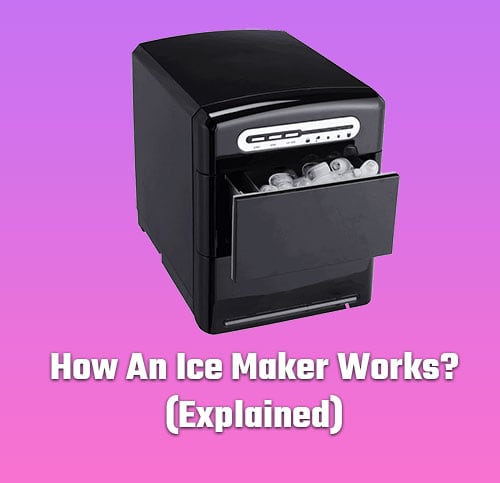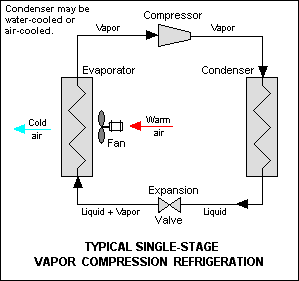Have you got a new ice maker? Have you ever thought- how does an ice maker work? In this article, I’m going to explain everything in detail.
So, keep reading…
A few years back, ice was counted in luxury items. In a hotter place, it was near impossible to get ice cubes. It is only found in refrigeration plants. Shopkeepers and restaurant owners order it and the supplier delivers bigger ice blocks.
Later, with the advancement of technology scenarios is change. Now the ice is available in every house. It’s all possible because of ice makers.
Table of Contents
How Does an Ice Maker Work?

There are various types of ice makers but the basic working principle is the same for all. It all works on the refrigeration cycle.
The refrigeration cycle consists of four thermodynamic processes- Compression, Condensation, Expansion, and Evaporation.
Now you might have a question in your mind- What is a refrigeration cycle?
Let’s understand in detail.
What is Refrigeration Cycle?

The refrigeration cycle is an important thermodynamic cycle used in HVAC and various refrigerators. This thermodynamic cycle consists of four thermodynamic processes.
- Compression
- Condensation
- Expansion
- Evaporation
1. Compression
Thermodynamic compression is a process to increase the pressure of any fluid or gas. An electric compressor is used for this process. In ice makers and home refrigerators, the refrigerant gas is used. The most common refrigerant used in domestic refrigerators or ice makers is R-134a (tetrafluoroethylene).
Due to the low evaporation point, the refrigerant changes its phase at low temperatures. An electric compressor increases the pressure and temperature refrigerant. Due to the low boiling point, it changes its phase.
2. Condensation
This high-temperature high-pressure refrigerant and goes to the condenser where the temperature of this refrigerant decreases to slightly above the ambient temperature. A fan is generally used in condensers. It could be liquid or air-cooled. In domestic freezers or ice makers, air-cooled condensers are used.
3. Expansion Valve
In the condenser itself, the temperature of the refrigerant came near the ambient temperature. But, the pressure of the refrigerant is still high. Now, this low-temperature refrigerant passed through the expansion valve. Due to the decrease in pressure of refrigerant in the expansion process, the temperature of refrigerant further decreases.
4. Evaporator
The low-temperature liquid refrigerant passed through an evaporator and it takes out the heat from there. Due to which a cooling effect is generated and again this refrigerant goes to the compressor and cycles continue.
This is how any domestic refrigerator works. This principle is used in ice makers too.
In portable ice makers, the evaporator is replaced by copper or steel rods. The temperature of these rods is below the freezing point of water. The water from the reservoir comes in contact with these extended rods and starts freezing.
After a certain period of time, the cycle reverses. Due to which the ice produced on the rod drops and a mechanism pushes it to the ice basket.
This is how the portable ice maker works. You can see some details in this video.
Frequently Asked Questions (FAQs)
Does Ice Maker Need Water Line?
Ice maker in fridges requires a water line while countertop ice makers come with a water reservoir which doesn’t require a water line. You can fill the reservoir with water and they automatically make ice out of it.
How Do Ice Maker in Fridges Works?
The working principle of all ice makers and refrigerators is based on the refrigeration cycle. However, design may vary from product to product. The refrigerant in fridges lowers the temperature inside and water frizes due to low temperature.
How Do Ice Makers Make Ice So Fast?
The cooling space is very less in countertop ice makers in comparison to a refrigerator. Also, the direct contact of extended tubes (that contain extremely cold refrigerant inside) with water freezes fast. That’s why ice makers make ice faster than refrigerators.
Conclusion
I know it’s a bit technical but I hope now you understood how an ice maker works. You can check the video to understand the process better. If you’re willing to clean your ice maker, read this guide. For b
